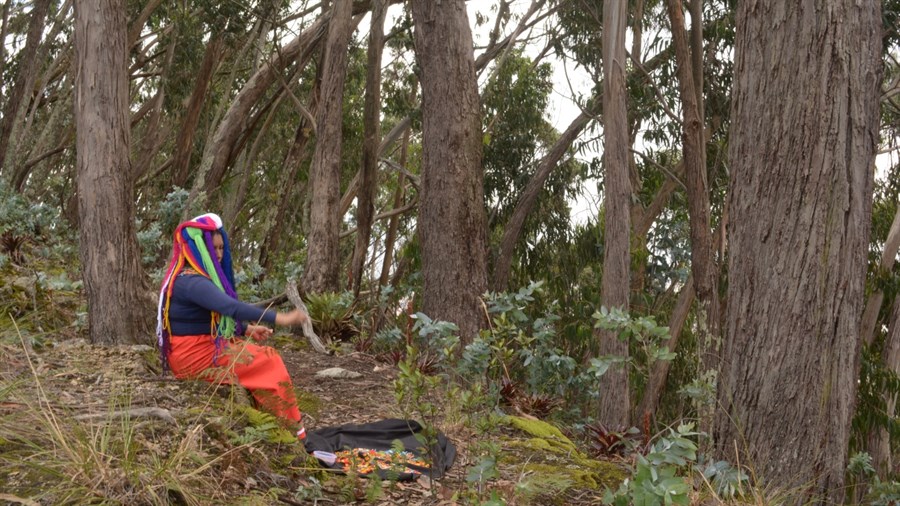Priscila Padilla is a Colombian documentarist and scriptwriter. With over 20 years of experience in the documentary field, her film work has always revolved around women’s issues and stories that help and contribute to women’s visibility and awareness, so that they may become empowered and help build a better country — because a developing society is one that should consider the inclusion of its women.
“Breaking the Silence” was scheduled to screen at the 2020 Hot Docs Canadian International Film Festival. A digital version of the fest has been organized due to the COVID-19 pandemic. “Breaking the Silence” is screening in Hot Docs Festival Online, which launched May 28 and is geo-blocked to Ontario, Canada. More information about the program and how to tune in can be found here.
W&H: Describe the film for us in your own words.
PP: This film conveys the pain and humiliation experienced by Indigenous Embera women in Colombia. They feel that their bodies have been mutilated and that they are victims of the ablation practice, which condemned them to live in solitude and ashamed of their bodies.
This story also invites us to witness the struggle in which these Indigenous women have engaged in claiming their right to have a clitoris — a right that has been denied to them for hundreds of years.
W&H: What drew you to this story?
PP: One Sunday morning, while reading the newspaper, I was dumbfounded by what I read: research, conducted in 2008 by the Medical Department of Risaralda, Colombia, that reported the deaths of several newborn baby girls from the Embera culture.
Their deaths were due to the clitoridectomy, or ablation, that had been performed on them. The procedure, which is usually known by the community as “the healing” [la curación], consists of mutilating the clitoris. For all I knew at the time, this practice was exclusive to some African and Asian cultures. I had no knowledge of its existence in America, let alone in Colombia. But, no. There it was. Really close to us — that is, us women. This compelled me to make this film.
W&H: What do you want people to think about after they watch the film?
PP: The film invites us, as a society in general and especially as women, to reflect on this matter so that we all may speak up about the clitoris without fear — about this feminine sexual organ that has been made invisible for decades and about which many myths have been created to exert social control over us women.
This is what this movie highlights: the way in which a group of Colombian Indigenous Embera women are fighting to eradicate the practice of feminine genital ablation on baby girls. After a long time, they have begun to fight for their right to have a clitoris so that their male partners may stop thinking that the clitoris is like a penis and that, for this reason, it must be removed, or else they will be alone and without a husband.
After many centuries, these women are now claiming the right to keep their clitoris. So, I pose a question: are we, those women who do have it, really aware of this organ that inhabits our body?
W&H: What was the biggest challenge in making the film?
PP: The biggest challenge in telling this story has been to get closer to these Indigenous women. First, I had to become friends with the men of the community. The men exert great control over these women; nothing is done here without their permission. This was the greatest of obstacles.
W&H: How did you get your film funded? Share some insights into how you got the film made.
PP: The documentary was funded by the Fondo para el Desarrollo Cinematográfico de Colombia (FDC) and IBERMEDIA, and through much perseverance by various Colombian entities.
W&H: What inspired you to become a filmmaker?
PP: Actually, when I was an adolescent, my future seemed to be to enroll in the Colombian guerrilla. At that time, two documentary filmmakers came to the countryside region where I was to shoot a movie, and my father was invited to work on it. The day I met these film directors definitely turned my life around. Over time, I became a filmmaker myself.
W&H: What’s the best and worst advice you’ve received?
PP: Best advice: Whenever I feel that the film is suffocating me and that I am losing control over it, I must let it go; let it fly away. It will then come back to me later and more clearly.
The worst advice was not become so immersed in the characters and the story because I would end up by losing the course of the narrative.
W&H: What advice do you have for other female directors?
PP: That we must learn to look, feel, and tell stories from our standpoint as women. Create our own aesthetics, without fear of being stigmatized. Only by narrating from the stance of difference can one construct one’s own discourse. It is not enough to be a woman, we have to construct and think about ourselves as women in everything we do.
W&H: Name your favorite woman-directed film and why.
PP: My favorite woman filmmaker is Byambasuren Davaa, a Mongolian documentary filmmaker. She is an artist in turning daily life into an eternal poem. With her film “The Story of the Weeping Camel,” she transformed my way of making documentary films.
W&H: How are you adjusting to life during the COVID-19 pandemic? Are you keeping creative, and if so, how?
PP: I have been writing a lot for my next documentary film. It has been a time for the creation and preparation of a new documentary film beginning.







